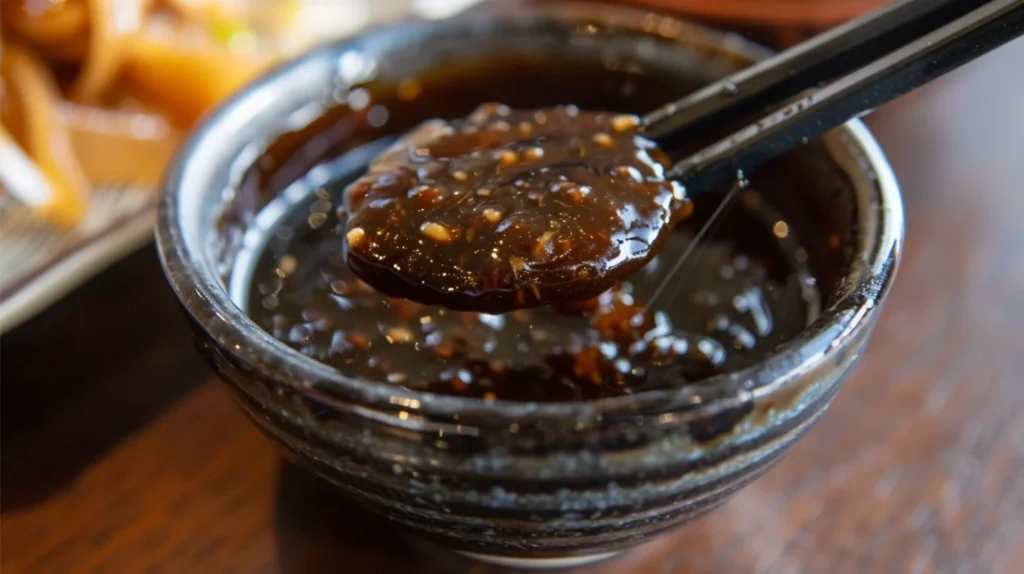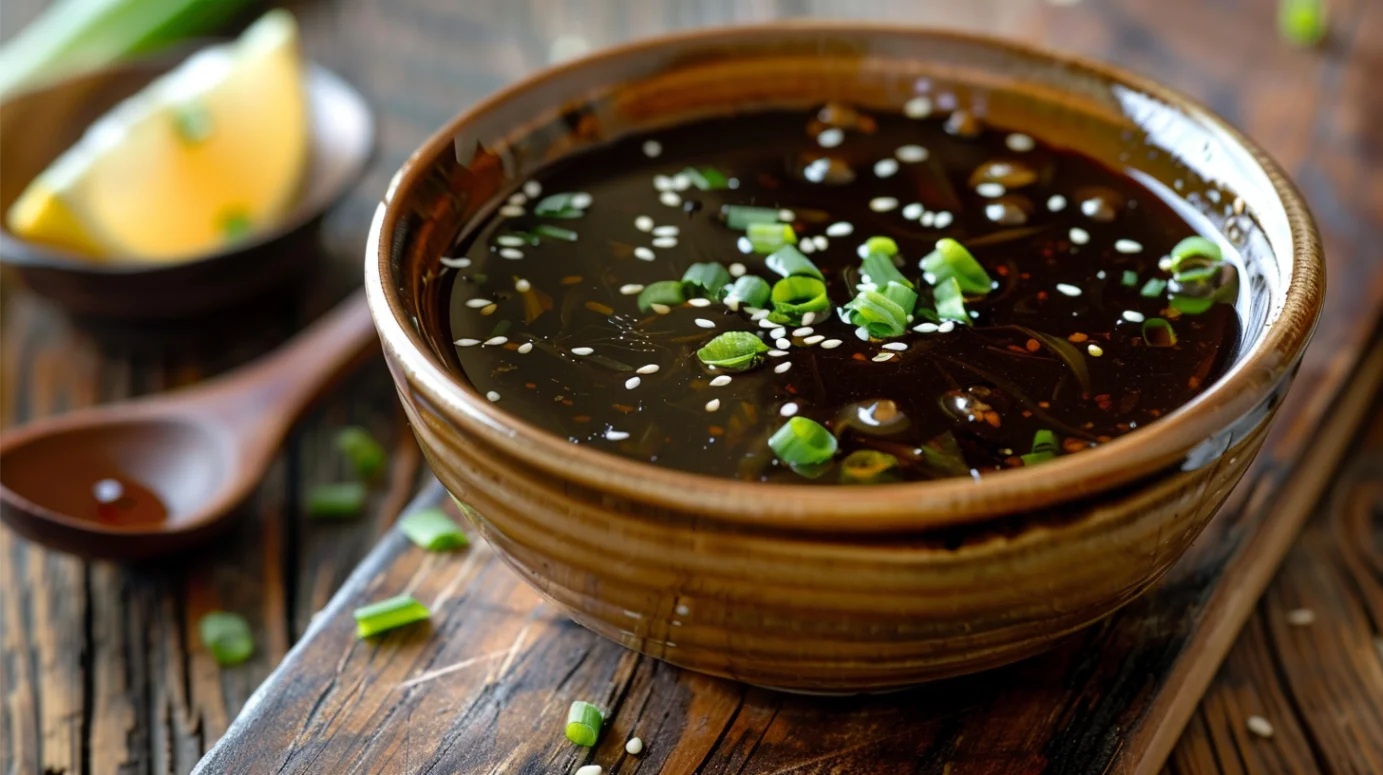The pictures in our articles might not always show exactly what the text is talking about. We use these images to make the article more interesting and eye-catching. They are there to add to the text, but not to replace it or show every detail.
Introduction: Unveiling the Secrets of Eel Sauce
Eel sauce, also known as unagi sauce or nitsume, is a beloved condiment in Japanese cuisine that has captivated taste buds around the world. This rich, sweet, and savory sauce is not only a staple for sushi lovers but has also found its way into various dishes beyond traditional Japanese fare. In this comprehensive guide, we'll delve deep into the world of eel sauce nutrition facts, exploring its composition, health benefits, and potential considerations for those watching their diet.
Whether you're a culinary enthusiast, a health-conscious diner, or simply curious about this flavorful sauce, this article will provide you with all the information you need to make informed decisions about incorporating eel sauce into your meals.
What is Eel Sauce?
Before we dive into the nutrition facts, let's briefly discuss what eel sauce is and its role in Japanese cuisine.
Eel sauce is a thick, dark, and glossy condiment that's traditionally used to glaze grilled eel (unagi) in Japanese cooking. However, its versatility has led to its use in various other dishes, including:
- Sushi rolls
- Grilled meats and vegetables
- Rice bowls
- Stir-fries
- Dipping sauce for tempura
The sauce's unique flavor profile comes from its main ingredients, which typically include:
- Soy sauce
- Mirin (sweet rice wine)
- Sake (rice wine)
- Sugar
Now that we have a basic understanding of eel sauce, let's explore its nutritional composition in detail.
Eel Sauce Nutrition Facts: Breaking Down the Numbers

Understanding the nutritional content of eel sauce is crucial for those who want to maintain a balanced diet while enjoying this flavorful condiment. Let's take a closer look at the key nutritional components of eel sauce.
Caloric Content and Macronutrients
Eel sauce is relatively low in calories, making it an attractive option for those watching their calorie intake. Here's a breakdown of the caloric content and macronutrients:
| Nutrient | Amount per Tablespoon | Amount per 100g |
|---|---|---|
| Calories | 20 | 211 |
| Protein | 0g | 0g |
| Fat | 0g | 0g |
| Carbohydrates | 5g (approx.) | 53g |
| Sugars | 4.5g (approx.) | 47g |
As we can see, eel sauce is primarily composed of carbohydrates, with a significant portion coming from sugars. This is due to the sweet ingredients used in its preparation, such as mirin and sugar.
Vitamins and Minerals
While eel sauce is not a significant source of vitamins and minerals, it does contain trace amounts of some nutrients. Here's an overview:
| Nutrient | Amount per 100g |
|---|---|
| Vitamin A | 0 mcg |
| Vitamin C | 0 mg |
| Calcium | 0 mg |
| Iron | 0 mg |
| Potassium | 0 mg |
Sodium Content: A Key Consideration
One of the most important nutritional aspects of eel sauce to be aware of is its sodium content:
- Sodium per 100g: 1263 mg
This high sodium content is primarily due to the soy sauce used in its preparation. For those on a low-sodium diet or with conditions affected by sodium intake, it's essential to consume eel sauce in moderation.
Other Nutritional Components
Eel sauce is free from several components that some individuals may need to monitor:
- Saturated Fat: 0g
- Trans Fat: 0g
- Cholesterol: 0 mg
- Dietary Fiber: 0g
Health Benefits of Eel Sauce
While eel sauce should be consumed in moderation due to its high sugar and sodium content, it does offer some potential health benefits:
Potential Health Concerns and Considerations
While eel sauce can be a flavorful addition to many dishes, there are some health considerations to keep in mind:
Incorporating Eel Sauce into a Healthy Diet
Despite these considerations, eel sauce can still be part of a healthy diet when consumed mindfully. Here are some tips for enjoying eel sauce while maintaining a balanced diet:
Eel Sauce in Different Diets
Understanding how eel sauce fits into various dietary patterns can help individuals make informed choices:
Vegetarian and Vegan Diets
Traditional eel sauce is not suitable for vegetarians or vegans due to the use of fish-based ingredients. However, plant-based alternatives are available or can be made at home using vegetable-based ingredients.
Gluten-Free Diets
Many eel sauces are naturally gluten-free, but it's essential to check labels or confirm with manufacturers to ensure no gluten-containing ingredients are used.
Low-Carb and Keto Diets
Due to its high sugar content, traditional eel sauce may not be suitable for strict low-carb or ketogenic diets. However, low-carb versions can be made using sugar alternatives.
Paleo and Whole30 Diets
Eel sauce is typically not compliant with paleo or Whole30 diets due to its sugar content and use of soy sauce. However, paleo-friendly versions can be created using coconut aminos and natural sweeteners.
DIY Eel Sauce: A Healthier Alternative
For those looking to control the nutritional content of their eel sauce, making it at home can be a great option. Here's a simple recipe for a healthier eel sauce:
Ingredients:
- 1/4 cup low-sodium soy sauce
- 1/4 cup mirin (sweet rice wine)
- 2 tablespoons sake (rice wine)
- 1 tablespoon monk fruit sweetener (or other natural sugar alternative)
Instructions:
This homemade version allows you to reduce the sodium and sugar content while still enjoying the rich flavor of eel sauce.
Eel Sauce Nutrition Facts: Frequently Asked Questions
To address some common queries about eel sauce nutrition, here are answers to frequently asked questions:
Is eel sauce healthy?
While eel sauce can add flavor to dishes, it should be consumed in moderation due to its high sodium and sugar content. It can be part of a healthy diet when used sparingly.
Can I eat eel sauce if I’m on a diet?
Yes, but it's important to account for the calories and be mindful of portion sizes. Consider using reduced-sodium or sugar-free versions if available.
Does eel sauce contain any allergens?
Eel sauce typically contains soy, which is a common allergen. Some varieties may also contain wheat or fish-based ingredients. Always check labels if you have allergies or sensitivities.
How long does eel sauce last?
Store-bought eel sauce can last several months when refrigerated after opening. Homemade versions typically last 1-2 weeks when refrigerated in an airtight container.
Can eel sauce be used as a marinade?
Yes, eel sauce can be an excellent marinade for meats, fish, or vegetables. Its sweet and savory profile can add depth to various dishes.
Conclusion: Enjoying Eel Sauce Responsibly
Eel sauce is a flavorful condiment that can enhance a wide variety of dishes. While it's relatively low in calories and fat-free, its high sodium and sugar content mean it should be consumed mindfully. By understanding the nutrition facts of eel sauce, you can make informed decisions about incorporating it into your diet.
Remember these key points about eel sauce nutrition:
- Low in calories but high in sodium and sugar
- Contains antioxidants that may offer health benefits
- Can be part of a healthy diet when used in moderation
- Homemade versions allow for greater control over nutritional content
Whether you're a sushi enthusiast, a home cook experimenting with Japanese flavors, or simply curious about this popular condiment, being aware of eel sauce nutrition facts can help you enjoy its rich taste while maintaining a balanced diet.
By making informed choices, practicing portion control, and considering healthier homemade alternatives, you can savor the unique flavor of eel sauce without compromising your nutritional goals. So go ahead, drizzle a bit of this savory-sweet sauce on your next dish, and enjoy the taste of Japanese cuisine with confidence!






